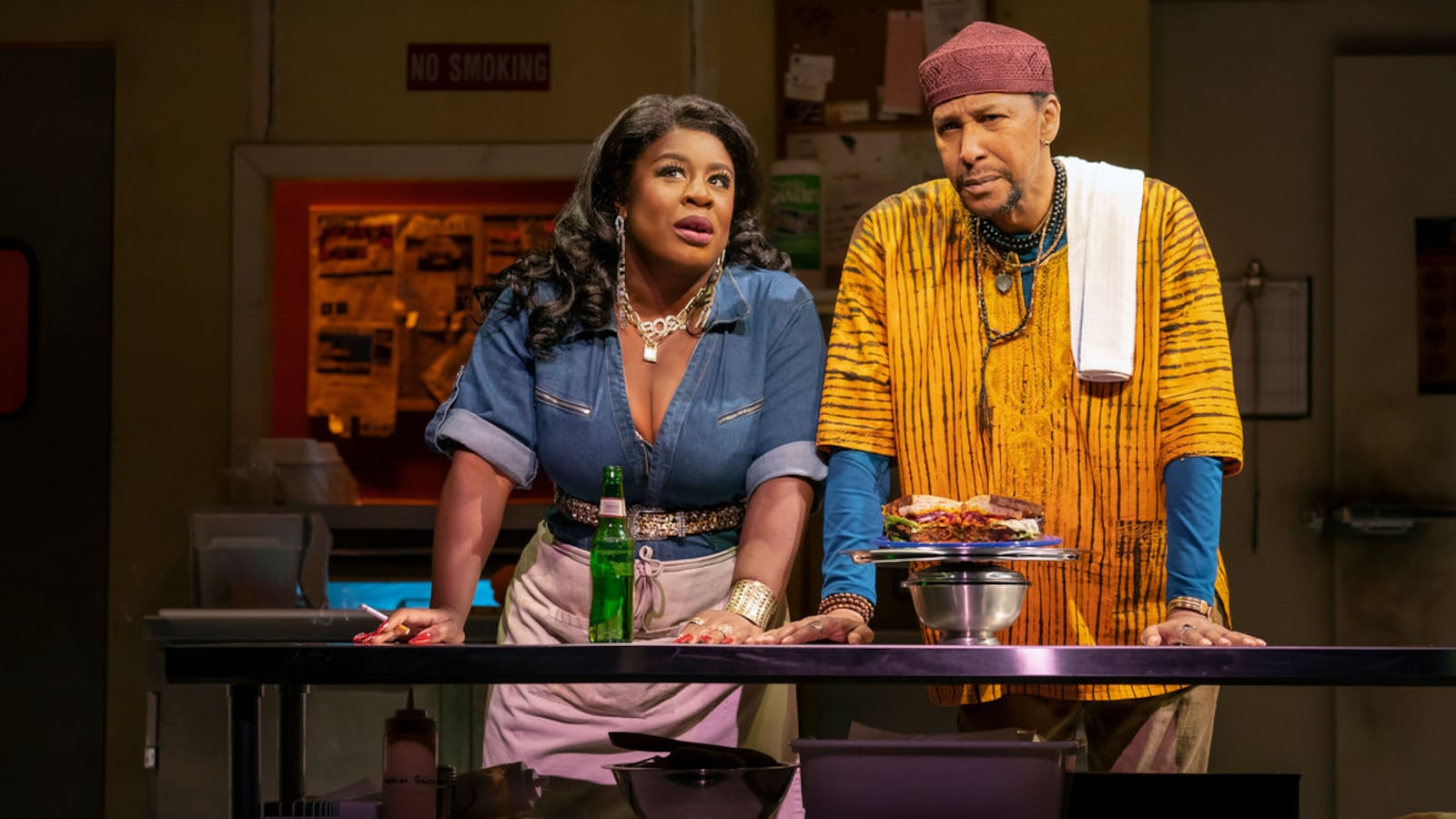My colleague Brooke Leigh Howard and I had such an animated conversation after we saw the play Clyde’s on Broadway, we tried to translate it to print.
Tim Teeman: In the program for Clyde’s, which opens at 2nd Stage’s Hayes Theater on Broadway tonight, the diner of the title of this excellent play is described as “a sandwich shop that sits on a nondescript patch of road in Berks County, Pennsylvania. A liminal space.”
So, while what faces us via Takeshi Kata’s kitchen set is immediately evocative—kitchen work stations, fridges, scuffed walls, the open window to the diner itself—the playwright Lynn Nottage also intends it as an arena of anger, joy, confession, and desire for her group of former convicts working for a better life, but beaten down at every turn by Emmy-winning Uzo Aduba’s whip-crack villain, Clyde, who is determined by viciousness—both quiet and boomingly loud—to keep her staff in their places.
Nottage—the first woman to win two Pulitzer Prizes for Drama—means this is to be a down-at-heel diner kitchen, and also a bigger psychological space to ask questions about redemption, cruelty, control, love, and ambition. It is set in the same county as her best-known play, Sweat, which just as confrontationally focuses on a group of characters trying to salvage something from life’s wreckage. Clyde’s asks questions about the malign primacy of our inner demons. And it also asks whether liberation is possible via the art of making the perfect sandwich. Forget all the big stuff. If you love sandwiches, go see this play! (It was originally called Floyd’s, but Nottage reportedly changed its name to distance it from the trauma associated with George Floyd’s death.)
Brooke Leigh Howard: The theme is so relevant, considering today’s socio-political climate. The court of public opinion can be so hasty to “cancel” a person based upon their past actions—even if those actions no longer represent how that person thinks or feels. Clyde’s does an amazing job addressing that people can change for the better, that the past does not have to define who a person is, that there is no one person more divinely righteous than another.
Tim: Aduba, who once wrote a moving article for The Daily Beast describing in raw detail her own journey to stardom, is clearly, visibly relishing playing such a seductively awful person. It tickles me that I have been watching her play the calm and rationality-insistent therapist in the most recent season of In Treatment on HBO because here she just lets rip. It must be so fun doing this, after playing a conservatively dressed and softly spoken character sitting opposite people on sofas the last few months, trying to talk them off ledges. Here she is determined to push her fellow characters off them.
Clyde is referred to as “the devil,” a label certainly earned by her relentlessly verbal and psychological battery of her employees. Indeed, at the beginning and end of the play, flames spring into literal life around her. Intriguingly, while we get to know what landed the other ex-cons at Clyde’s or hear details about their fractured lives in their own voices, Clyde herself offers up no tug on our heartstrings. And yet, you miss her when she’s not on stage, encased in costume designer Jennifer Moeller’s striking range of tight wrap dresses or PVC and leather trousers—a proud dominatrix in the everyday. And Aduba hints, in her cacklingly executed crushing of dreams and snarling meanness, there is a reason why she is the way she is, beyond wanting to simply inflict misery.
Brooke: That’s the jewel that is Clyde; she represents the hardships of life itself. She's the domino effect of how everything else goes out of whack, but we don’t realize what exactly started that domino effect. We only hear myths and legends about what started the fire. Clyde is like “Big Brother” monitoring every single thing her employees do—and she threatens them when it's to her advantage.
Clyde is representative of societal pressure reminding us that we're all on the verge of failure. She wants us to survive and live day to day rather than envisioning something larger. And while she’s this abusive maternal character, we still strive to be in her good graces. We want to make her happy even though we think she's the devil reincarnated. It’s truly a sense of Stockholm Syndrome. It’s very poetic. People want to be the absolute best version of themselves, but they also don't want to disrupt the order while in that process.

Uzo Aduba, Kara Young, Ron Cephas Jones, Edmund Donovan, and Reza Salazar in “Clyde’s.”
Joan MarcusTim: In the kitchen itself are Montrellous (Ron Cephas Jones, the Emmy-winning actor who plays William on NBC’s hit family drama This Is Us), Letitia (Kara Young), Rafael (Reza Salazar), and newcomer Jason (Edmund Donovan). Montrellous is described, dead seriously and accurately, as a sensei, and he indeed presents as an otherworldly, unflappable, saintly mentor. While Clyde can get away bashing the younger staff, she is on less sure ground with him, particularly as her great weakness is his gorgeous visions for sandwiches. She rails that the staff must make the most basic sandwiches for the trucker clientele, but Montrellous leads the team in a rebellion made up of garnishes and perfectly grilled meats and vegetables. When you leave Clyde’s your mouth will be watering for any one of the creations as evocatively described by its characters.
Brooke: The roles definitely parallel with classic literary stock characters. Letitia, or “Tish” as she was referred to, was the daydreaming young woman looking for a better future. There was still a girlish and innocent quality about her—despite her drug addiction and the relationship she had with the father of her child. Rafael was more a clownish character who served simple laughs for the audience. But together with Letitia, they were a blossoming pair of lovers that the audience hoped for in a story with so much wreckage. Jason was the novice and outsider who clearly didn't belong but eventually found his way. Those three characters looked to Montrellous truly as a teacher, as a beacon of hope. Montrellous was the anecdote to Clyde’s negativity. Where Clyde was satisfied with her employees simply surviving, Montrellous wanted them to live.
You mentioned Clyde’s attire—which was impossible to miss with her stiletto heels, wide belts, gaudy jewelry, dragon-lady nails, and ever-changing wigs. In a way, she reminded me of the quintessential social media facade. To her employees, she was nearly like an evil deity whose status they could not attain. They saw the control she had, the fake glamor, the shine and glitz. But if they really paid attention, they could’ve seen how damaged she was also and how she attempted to use gold-plated material to mask her wounds. Jason came close to calling her out.
Tim: I think what is most powerful about the show, as with Nottage’s Sweat, is how convincingly epic it quickly makes the everyday feel. Here are very small lives which seem huge, thanks to brilliant writing and just-as-brilliant acting. It is also notable that Clyde’s features a happy ending, for everyone. The temptation with a drama like this is to go 100 percent gray and scratchy realism, but Nottage does not do that. The end brings together all the themes in one sandwich. Until then, each character has struggled to make their personal best, but then the climactic sandwich—the sandwich that may yet undo Clyde—is a creation of them all. And with their signature ingredient deployed, they are free.
All through the play, through odd lighting pauses and strange kinks of time and surreal fancies, the kitchen has seemed a magical space as much as a liminal one. For Nottage, transformation of all kinds—temporal, human, spiritual—is possible and to be prized. Love is possible, as two characters show us. Ambition is possible. Forgiveness is possible. Goodness is rewarded. There is an element of fairytale to this play, too: these characters in a diner somehow outside time seeking bigger things. They come together like the characters in The Wizard of Oz to face a wicked witch—although Clyde is more broken than wicked—and their own demons. Then they discover they had the power they needed all the time.
Brooke: The tight space of the stage really echoes the complexity of a sandwich. For the duration of the production, Clyde’s employees try to create whatever their idea of a perfect sandwich is. They’ll concoct different ingredients and elements that may not complement one another by themselves. But stacking them together, one package makes the flavorful story complete. The same can be said about the employees at Clyde’s. Individually, it's hard to fathom that they would be in the same space. But collectively, they create this intense smorgasbord of personality that's fulfilling. Nothing seems to be out of place or missing.
Tim: Director Kate Whoriskey really is an exacting master of this small space. The characters whirl, dance, confront, and tease in a complicated ballet as lettuces get menacingly chopped and food conveyed to the window. In 95 minutes we get to know the characters so well, and if the play starts unevenly, the entry of Jason somehow clicks the other characters and events into smooth gear.
Young is particularly excellent, at turns sharp-tongued, hilarious, and painfully vulnerable. Donovan makes Jason threatening, insightful, and a big softie. Just as she did in Sweat, Nottage is as good sketching moments of broad comedy—Donovan is a ringmaster here—as she is with the deeper canvas of pain and dispossession the characters emerge from, and sometimes jolting them alongside one another. The rich economy of the writing is the real joy in Clyde’s. Afterward, no surprise, I went straight to my local deli whose sandwiches always seem pretty close to perfect for me.








